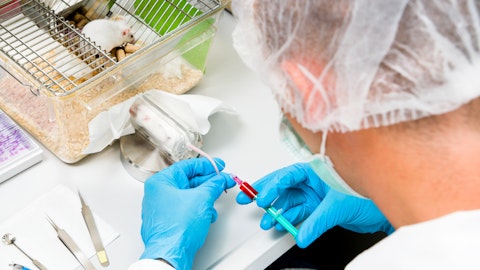Robert Ford: Sure. Well, China has been and will continue to be an important market for us as it relates to I think this theme on this anti-corruption discussion point there. Listen, we’ve been operating in China for 35 years. We follow our compliance standards, follow all applicable laws. I didn’t see any kind of meaningful impact in Q3. Larry, I was actually there last week and had a chance to meet with the teams and go through the businesses and I didn’t really see any meaningful impact. Devices grew 20% in the quarter, so I think that’s — we’ll just have to keep on monitoring that situation. But I didn’t see any real impact in the quarter. As it relates to VBP, listen, this is — this is a term that’s used for China, but I think it’s just a common theme that we see across the world with governments trying to provide the care to their populations and manage their budgets.
So I don’t think this is anything completely extraordinary than what we’ve seen. There was a VBP on the EP business. That process started earlier this year in April. I’d say about 80% of the market has now been implemented, and I expect the remainder of that to be implemented by year end. Yes, there’s a little bit of a price impact that we felt, but net-net, it was positive for our EP business in China, because we were able to pick up share and pick up volume. So I think that’s the status there. I think we announced a VBP on diagnostics. That’s not unexpected either. I think the process will start sometime in the first half of next year. Right now, from the list of products that we’ve seen, it involves about 20% of our core lab business. And then as we’ve seen with businesses that have capital and service tied to it, the rollout is a little bit different from the rollout that you see on, what I would call, more pure consumables.
So it’s more of a kind of phased approach like we saw in EP. Each province will go and do their implementation. It will take a few quarters to implement here. But like I said, I don’t think these are different than what we see in other markets in terms of how we manage the balance of our technology and our access. But I think China is still a big opportunity of growth, not just in devices and diagnostics, but in adult nutrition and our pharma business. So, it’s an important market for us and the team is doing a really good job at operating there.
Larry Biegelsen: Thanks so much.
Operator: Thank you. Our next question will come from Robbie Marcus from JP Morgan. Your line is open.
Robbie Marcus: Oh, great. Thanks for taking the question. Congrats on a really nice quarter. Robert, I want to ask you the overwhelming topic of discussion the past few months has been GLP-1s and the possible impact on the future medtech market growth. You talked about it with respect to diabetes, but I’d love to just get your thoughts on a broader basis on GLP-1s, and do you see it as a negative, neutral, or positive to your different end markets you participate in over the next five, 10 years. Thanks a lot.
Robert Ford: Sure, Robbie. Obviously, this has been a hot topic over the last couple of months. Let me just start off by saying with 20 plus years of experience in diabetes, I think every time new therapies, new technologies come to address this disease and this population, I think it’s all great. And these are great new medications that are going to have very positive effect on the treatment of diabetes. There’s obviously a lot of investor angst here, Robbie, about the potential impact of these drugs and what’s going to happen to different industries and different companies. I feel that the investor angst is probably driven more by those that have a little bit less domain knowledge in medtech, I would say, it seem to be moving a lot with like headlines or any new study or publishment there or publishment of any kind of study headlines, et cetera.





